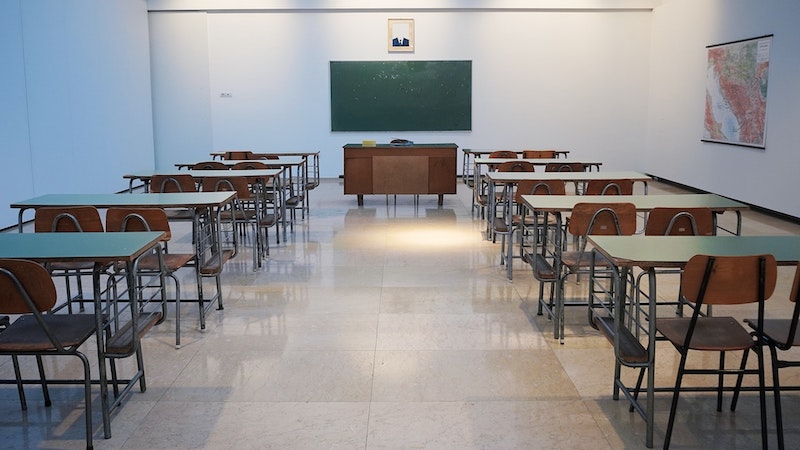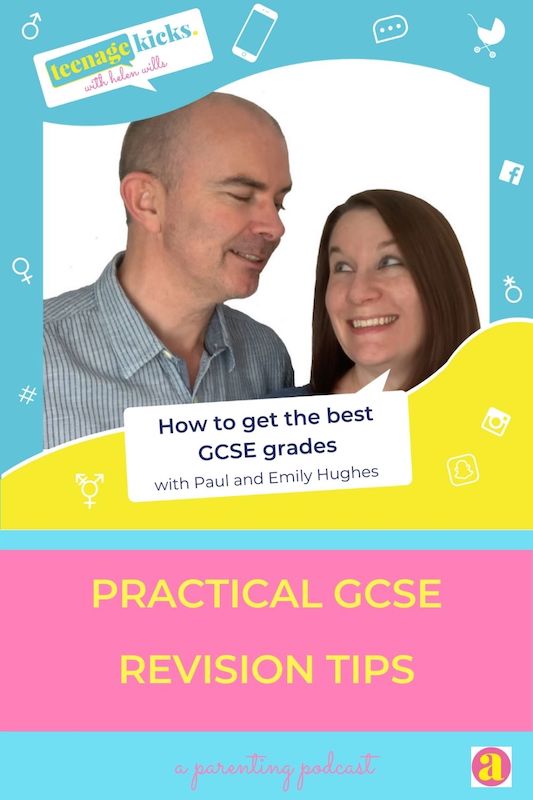If your child is due to sit GCSEs, the chances are they and you might be feeling quite stressed about the revision they may or may not be doing, and their eventual exam results.

Photo by Ivan Aleksic on Unsplash
I recall this feeling myself from when my daughter had the extra stress of uncertainty around how GCSEs would be graded during Covid-19, and much of the conversation in the featured podcast episode below focuses on that 2-year blip in our educational history. However, the revision tips and ideas on how to help your teenager prepare for GCSE exams – and maximise their chances of good grades – are all very relevant, so do listen.
How to help your child revise for GCSEs
This episode of the Teenage Kicks podcast addresses those worries. Teachers Emily and Paul Hughes recognised that parents were struggling to know how to help a child revise, and came up with their website Parent Guide to GCSE. Their resources aim to answer common questions parents have about their children’s secondary school homework and offer revision advice for parents to support their teenagers.
Listen to the podcast
Emily and Paul have 33 years of teaching experience behind them, as Head of Maths, and 6th Form Tutor and lead UCAS tutor respectively, so they’re well-placed to advise families on maximising their chances of good GCSE grades, whatever their current situation. They gave me 6 great tips for year 11 students to get the grades they deserve.
Practical revision tips for GCSEs during Covid-19
In the podcast Emily and Paul answer the question of how to pass your GCSEs in straightforward terms, starting with this piece of advice:
“The most important thing you can do right now is impress your teachers.”
- Impress your teachers. Many subjects have coursework that’s initially marked by teachers, so it always makes sense to show your teachers what you’re capable of. But the knock-on effect of showing your teachers your best work is that you’re actually producing your best work. That means you’ll be learning, improving on how you answer questions and write essays, and doing revision as you go, which will set you up to do well in exams.
- Be proactive. This means doing more than you need to. Complete all the work set by your teachers, but do as much as you can on top of this to give your teacher the evidence they need to award you the coursework grades you deserve, and to understand your full potential. You could show your teacher your revision cards, or write practice essays that demonstrate your wider knowledge. Submit these for feedback, or ask if your teacher might be willing to mark an extra essay. It all helps to give a teacher a fuller idea of your ability, and support you to reach your full potential.
- Use past papers. Testing yourself is one of the most effective ways of cementing your knowledge, and completing past papers – even if you get lots wrong – helps you figure out what you need to spend more time on. Marking schemes are available online, and you can ask your teachers to mark essay subjects for you.
- Approach every test as if it’s a final exam. If you do your best it will help raise your grade and ensure you will have done some great revision for the final tests.
- Make a revision plan. A good revision plan doesn’t need colour and glitter! It only needs to take 10 minutes to make one – the most important thing is that you stick to it!
- Make your revision effective. Paul and Emily talk a lot about working smarter, not harder. With good revision techniques and no procrastination a 5 minute revision session can be more effective than a longer time spent re-reading notes.In fact, looking over notes is one of the least effective ways to move information into your long term memory. Instead, Emily and Paul suggest using Kahoot or Quizlet to set yourself short tests that can be repeated more frequently.Another revision hack they love is Mind-Mapping. Create a mind map of your subject, then turn it over and try to recreate it. Each time you do this you’re creating another link for the brain to access that information more easily the next time.
Listen to the podcast:
You can find the episode in your usual podcast app, or if you prefer, you can listen online below, or through the podcast page.

You can find more from Emily and Paul on their website Parent Guide to GCSE, where you can download their free revision planner, or subscribe for their full service and receive weekly tips on supporting your child through their GCSEs. Or you can access the same information in Emily’s book GCSE Survival Guide for Parents (affiliate link).
You can also join the Parent Guide to GCSES community on Facebook, where Emily explains all the latest updates from the government in straightforward terms so that parents and teens can cut through the jargon to find what really matters to them.
When should you start revising for GCSEs?
The answer is right now! Whatever year you’re in you need to take every end of module test as seriously as if it counted towards your final GCSE result. Coronavirus showed us that nothing is certain, and teachers may well need to contribute to your GCSE assessment in some form every year.
If nothing else, doing the revision for tests means you’ll be in a much better place when the real things come round. Once you start actual GCSE modules (usually in year 10) the need to revise content for every test becomes even more important, as this will form the basis of your learning for the actual exams when they happen.
How much revision should teens be doing for GCSEs?
As much as possible! But don’t let it wear you down. Teenagers need to mix short bursts of effective revision with breaks for exercise and relaxation. The most important thing is to make a sensible revision plan and stick to it, with regular short breaks for fresh air, downtime and a change of scenery.
How can I get my child to revise without feeling like I’m nagging?
Firstly, avoid telling your teenager what you think they should be doing. Instead, ask questions about their subjects, and how they’re feeling about their revision. Make time to eat together or go for a walk, and let them use the time to run through all the things they’ve learned. It will help them figure out where the gaps are in their knowledge.
How important are GCSEs?
GCSEs are an important part of your education because they allow you to progress to the next stage of your studies. All schools and colleges require at least a Maths and English GCSE pass for you to be able to access A-Levels and further study. Schools also require certain GCSE grades in the subjects you plan to study at A-Level.
What happens if you fail your GCSEs?
“If I fail my GCSEs is my life over?” is a question I see lots of teens asking and the answer is absolutely no. The options open to you are appeals or resits. If neither of these are an option for you, don’t panic. There are plenty of jobs that don’t require GCSEs. Retail, the emergency services and the military are all areas where you can work your way up without formal qualifications.
It is possible to resit exams that are needed for progression to the next stage of your education. English and Maths are usually required for college courses, and most subjects have resit dates in the Autumn. Check with your school or examining body.
Do GCSEs matter after A-Levels?
GCSEs seem to become less important the further away you get from them. At 57 I can honestly say I haven’t been asked the results of any of my GCSEs (or O-levels as they were when I sat them) since my University interviews. However Universities do take GCSEs into consideration when making offers, and they’re likely to count towards Apprenticeships too.
If you’re following a career path based on your A-level subjects your GCSE results shouldn’t matter too much once you have your A-level grades. But employers might want to see a good Maths and English GCSE result if those weren’t your A-level choices.
You can retake GCSEs at any age, so if you find you need certain subjects later in your career, you will be able to retake GCSEs in college.

THANK YOU FOR READING
If you’ve enjoyed this post and found it useful here are some ways you can say thanks and support Actually Mummy:
- Click here to buy me a virtual coffee.
- Join our Teenage Kicks Facebook group which includes lots of advice and support for parents of teenagers. You can post your own problems and advice here too.
- Click here to leave a review of the Teenage Kicks podcast.
- Click here to sign up to our newsletter packed with tips, ideas and support for parents of teens.
- Share this post with your friends.
- Follow me on Facebook, Instagram or Twitter.
Subscribe to the Teenage Kicks podcast
Thank you so much for listening! Subscribe now to the Teenage Kicks podcast to hear about the new series when it begins. I’ll be talking to some fabulous guests about difficult things that happened to them as teenagers – including losing a parent, being hospitalised with mental health problems, and battling an eating disorder – and how they overcame things to move on with their lives.
I’d love to hear from you if you have any suggestions for future topics on the Teenage Kicks podcast. Use my contact form to send me an email, or you can find me on Instagram and Twitter at @iamhelenwills. I appreciate every message, and love to hear from my listeners.
I’d love it if you’d rate and review the podcast on iTunes too – it would really help other people to find it.
For information on your data privacy please visit Zencastr. Please note that I am not a medical expert, and nothing in this blog or in the podcast should be taken as medical advice. If you’re worried about a young person please seek support from a medical professional.
Join me in the Teenage Kicks Facebook group
If you’re a parent of teens it can be difficult to know where to go for advice, to vent, or just to talk. So I’ve made the Teenage Kicks Facebook group, for all parents of teenagers to chat in a safe space. It’s a private group and everyone in there will be a parent of teenagers.
And if you’re stuck for how to engage with your teenager, this list of things for teens to do might be helpful.
[button link=”https://www.facebook.com/groups/486393358908628″ type=”icon” newwindow=”yes”] Join the Teenage Kicks Facebook group[/button]
PIN FOR LATER

